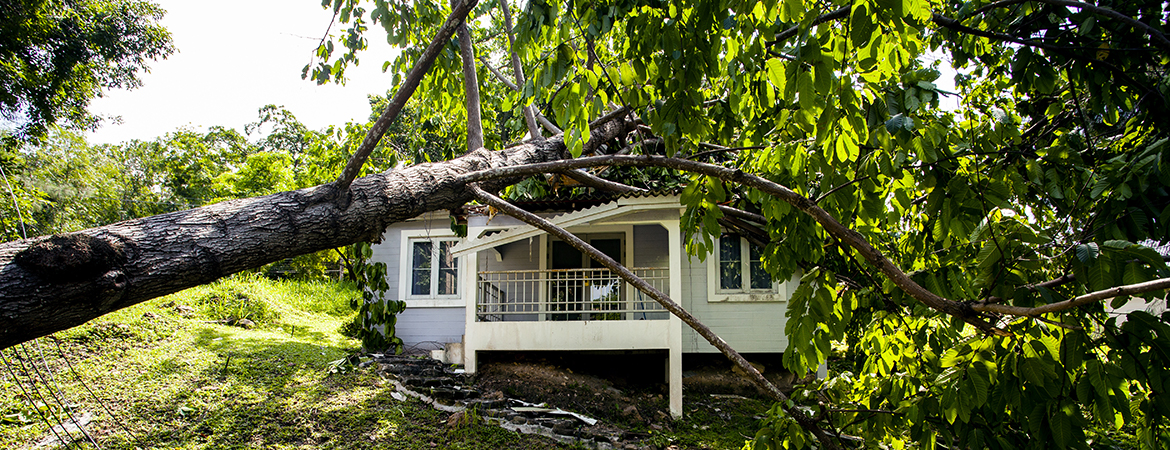Fallen trees: What's covered (and what's not) on your insurance policy
Fallen trees, damages, and homeowners insurance, oh my! This list of FAQs may help you navigate what to do if a downed tree damages your – or your neighbor’s – property.

If anyone knows just how unpredictable the local weather scene is, it's us. Time and again, the agents and employees of Kentucky Farm Bureau Insurance have witnessed powerful storms that have caused all kinds of property damage across the state, sometimes taking out even the healthiest of trees and oftentimes leaving homeowners wondering how to pick up the pieces.
Hopefully, the following list of frequently asked questions regarding your responsibilities for property damage resulting from fallen trees can help shed a little light on some common scenarios. But we also know each situation can be unique, so reach out to your local Kentucky Farm Bureau Insurance agent for more information. Let’s get started…
Q. If a neighbor’s tree falls on my property, am I responsible?
A. Typically, any damage caused by a tree that falls on your property — regardless of where the tree came from — is your responsibility. So, if a storm causes neighbor Bill’s oak tree to fall onto your property and damage your roof, you will need to file a claim with your insurance agent. The opposite is also true. Say your poplar tree is struck by lightning and falls onto Bill’s roof. Bill will need to file a claim with his insurance company to cover that damage.
However, if the fallen tree was poorly maintained or diseased and the owner took no steps to take care of it, the owner or their insurer could be responsible for the damages. If your neighbor or neighbor’s insurer makes a claim against you, the best practice is to call your insurance agent.
Q. If a wind storm knocks down a tree on my property, does homeowners insurance cover the removal of the tree?
A. The answer depends on the situation. If a tree hits an insured structure, like your house or storage building, your Kentucky Farm Bureau homeowners policy likely covers the cost of removing the tree from the damaged structure. (There also may be additional coverage for debris removal up to $500 to remove the fallen tree(s) from the premises.) Again, call your insurance agent to determine what coverages, if any, apply.
However, if the fallen tree did not land on any insured structures, then the clean-up is generally your responsibility.
Q. If a fallen tree lands on my car, will my homeowners insurance policy cover it?
A. Your homeowners insurance policy will not cover the damage to your car, but your auto policy possibly will – as long as you have “other-than-collision” coverage with KFB. Remember, you will need to file the claim with your insurance company regardless of where the tree fell from. So, even if your neighbor’s tree fell into your driveway, it’s still your responsibility to file the claim.
Q. If a fallen tree lands on my detached garage or storage building, will my homeowners insurance cover it?
A. If the tree was felled by an accident or weather, your standard homeowners insurance policy, in most cases, should cover the damage to detached buildings. However, if you have a beloved garage or hobby shed out back, we suggest you call your local agent today to ensure that it would be covered in its entirety under your existing policy.
Q. Should I start making repairs before you inspect the damage?
A. In this case, you’ll be eager to start putting your home back together, and you should take steps to protect your property from further damage — cover broken windows and gaps in the roof or exterior walls, etc. Otherwise, it is important for an inspection to be completed by a claims representative before repairs are performed to identify all of the damages that may be covered by your policy, ensuring the estimate for damages is accurate.
Q. If my home is uninhabitable, will you cover a hotel stay?
A. If your policy has additional living expenses coverage and a direct physical loss makes your home uninhabitable, then we will pay for the reasonable increase in living expenses necessary to maintain your normal standard of living. Check your policy for coverages and limits, and keep receipts for additional living expenses that you pay out of pocket. A claim representative or your local Kentucky Farm Bureau Insurance agent can answer any additional questions about this coverage.
Q. How can I be proactive?
A. Taking care of trees before a disaster strikes can prevent potential problems and save you the cost and trouble of cleanup and repairs. Keep trees trimmed, remove dead branches, and consult a professional if you are worried about the condition of your greenery. Arborists can examine trees for subtle signs of trouble that you may otherwise overlook, including issues like underground root disease, according to the Insurance Institute for Home and Business Safety. This can save you a lot of hassle in the long run (and it may save your relationship with any nearby neighbors, too).
Do you have a question that was not answered here? Your local Kentucky Farm Bureau Insurance agent would be happy to discuss any concerns you have regarding trees, property damage, and your specific policies.
*The questions and answers above are provided as general guidance. The actual facts of the situation and the terms, conditions, and exclusions of the applicable policy will determine whether coverage applies.
>> At Kentucky Farm Bureau, we’re just as invested in your home sweet home as you are. We help protect what’s important to you – from farms and fishing boats to minivans and mobile homes. To see a full list of products we insure, click here.
